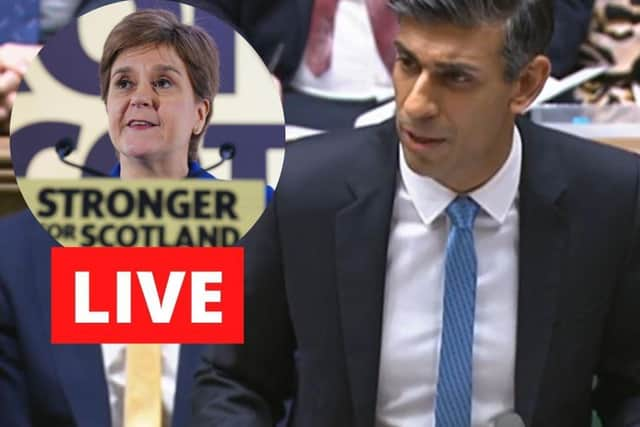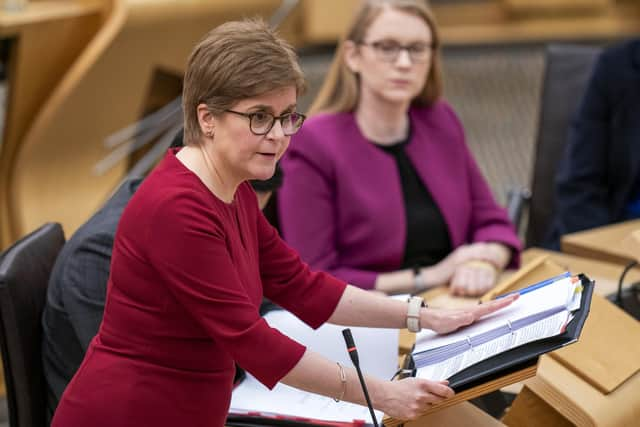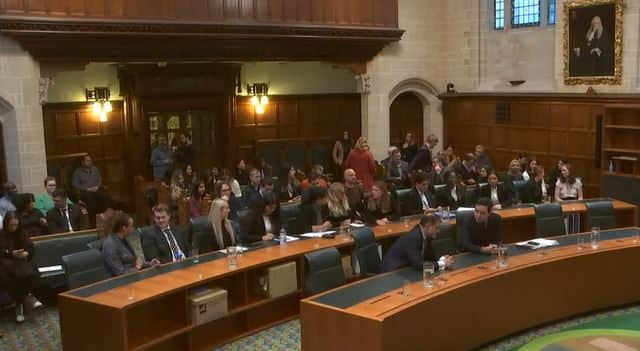Scottish independence RECAP: Rishi Sunak will “look to” avoid Indyref2 as Downing Street veto de facto referendum post Supreme Court ruling
In a statement, the First Minister said a “de facto” referendum is the most obvious choice for a lawful vote on independence.
The SNP is not abandoning the independence route, “Westminster is blocking it”, the First Minister claimed as she said the Scottish Government will find a new way to hold a referendum.
Advertisement
Hide AdAdvertisement
Hide AdThe UK Government does not agree with Nicola Sturgeon’s proposal to use the next election as a de facto referendum, Downing Street has said.


Asked whether the Prime Minister agreed with the plan, his press secretary told reporters: “I don’t think that is the position of the UK Government.
“The Supreme Court’s decision today has been very clear.”
Announcing the Supreme Court’s unanimous decision, the court’s president Lord Reed said that legislation for a second independence referendum would relate to “reserved matters” and was therefore outside the powers of Holyrood.
He said: “A lawfully-held referendum would have important political consequences relation to the Union and the United Kingdom Parliament.
“Its outcome would possess the authority, in a constitution and political culture founded upon democracy, of a democratic expression of the view of the Scottish electorate.
“It would either strengthen or weaken the democratic legitimacy of the Union and of the United Kingdom Parliament’s sovereignty over Scotland, depending on which view prevailed, and would either support or undermine the democratic credentials of the independence movement.
“It is therefore clear that the proposed bill has more than a loose or consequential connection with the reserved matters of the Union of Scotland and England, and the sovereignty of the United Kingdom Parliament.”
On Wednesday morning, the panel of five justices will delivered their verdict, in the wake of hearing arguments on behalf of both the UK and Scottish governments last month.
Advertisement
Hide AdAdvertisement
Hide AdThe Scottish Government’s top law officer, the Lord Advocate, asked the Supreme Court to rule on whether Holyrood has competence to legislate for the vote.
During a two-day hearing in October, Dorothy Bain KC said resolving the legality of the proposed Scottish Independence Referendum Bill is a “critically important question”
The UK Government’s representative, Sir James Eadie KC, argued the Bill “squarely and directly” relates to a matter reserved to Westminster.
Nicola Sturgeon to make statement in response to Supreme Court ruling
In his analysis piece today, Conor Matchett writes: “Should the UK Government win, however, Ms Sturgeon will be handed one of her most powerful rhetorical weapons. Confirmation the UK Government is the only institution that can grant a referendum would lead to significant questions about the nature of the union and whether it remains one of consent.”
And if you want to read this piece, it is avaibale to subscribers old and new. You can join HERE


The Supreme Court has come to a unanimous judgement on the indyref2 case Lord Reed says explaining the quick turnaround for judgement. He adds the Scotland Act gives Holyrood “limited” powers was another reason for the judgement being came to quickly.
Lord Reed says that the Supreme Court is making a ruling on interpretation of the provisions of the Scotland Act as it is in the public interest.
Lord Reed says that the proposed bill relates to reserved matters and the Scottish Parliament does not have the power to legislate for an independence referendum.
Announcing the Supreme Court’s unanimous decision, the court’s president Lord Reed said that legislation for a second independence referendum would relate to “reserved matters” and was therefore outside the powers of Holyrood.
He said: “A lawfully-held referendum would have important political consequences relation to the Union and the United Kingdom Parliament.
“Its outcome would possess the authority, in a constitution and political culture founded upon democracy, of a democratic expression of the view of the Scottish electorate.
“It would either strengthen or weaken the democratic legitimacy of the Union and of the United Kingdom Parliament’s sovereignty over Scotland, depending on which view prevailed, and would either support or undermine the democratic credentials of the independence movement.
“It is therefore clear that the proposed bill has more than a loose or consequential connection with the reserved matters of the Union of Scotland and England, and the sovereignty of the United Kingdom Parliament.”
